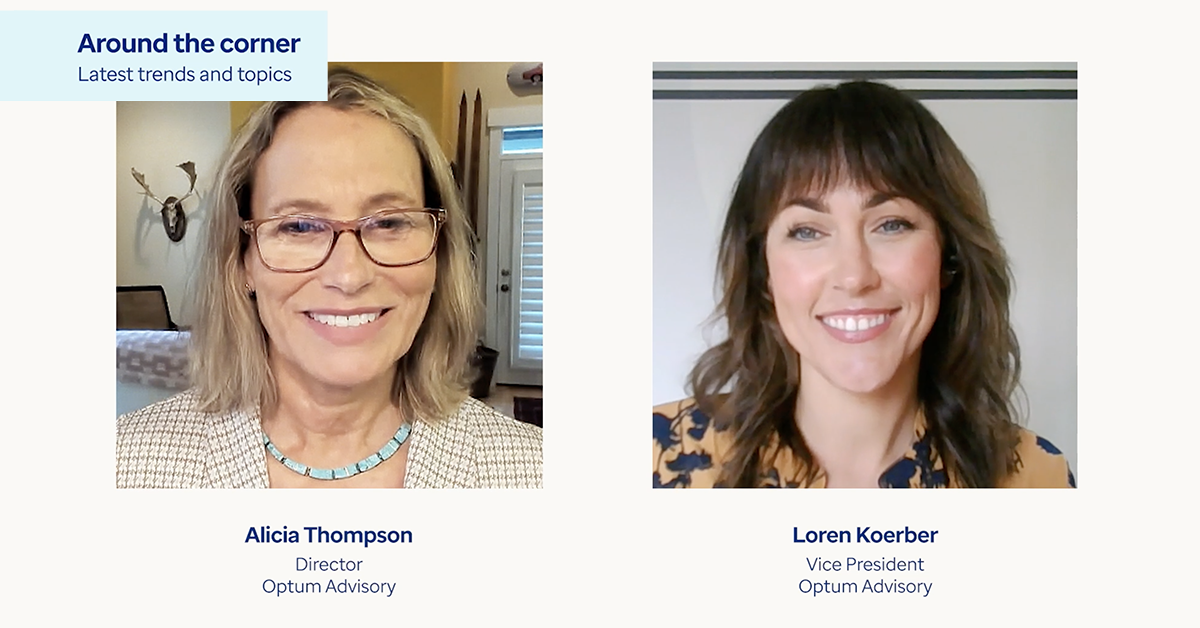Stars performance is in your control — take action now
Optum experts, Lauren Sansbury, VP Payer Solutions, and Tejaswita Karve, Senior Director Stars Practice, discuss the impact and implications of a CAP and how Star Ratings are interconnected. Viewers will also learn steps to avoid, monitor and move forward if a CAP is issued as a result of Stars underperformance.
LAUREN SANSBURY: So last year, we talked about this last session, that we were forecasting significant drops in overall stars ratings. And many plans did, in fact, see their stars ratings drop, several below three stars overall. Can you share how stars performance has an impact on cap requests?
TEJASWITA KARVE: So 2023 stars, which was released last October, was a dramatic reversal from year 2021 and 2022 stars, which were released during COVID-19 public health emergency. That time, plans enjoyed emergency CMS flexibilities and there were blockbuster five star plans on the market. And as I shared in advanced notice webinar in March 2022, those flexibilities were removed for 2023 stars.
LAUREN SANSBURY: We talked a lot about that in our last session.
TEJASWITA KARVE: Yep, yep. And the weights went up, right, for member experience measures as well, four times. So many small, large, and nationals, even, saw a drop in their star rating, not just below four stars, but below three star overall performance. And once a plan receives below three star performance and it can be on part C summary ratings, part D summary ratings, or overall ratings, CMS will automatically issue what we call ad hoc cap for our underperformance and star rating. In fact, one national plan actually has over 50 percent of their contracts on cap just for underperformance and star, 2023 stars alone. And that translates to around 365 million loss in quality bonus payments for poor stars performance.
LAUREN SANSBURY: Wow.
TEJASWITA KARVE: One more - yep. Huge number, right? One more thing to remember is ad hoc caps. Ad hoc caps are issued by some trigger event. In this case, poor star's performance. Unlike your standard caps, which are resolved of CMS, any CMS audit, which can be program integrity audit or one third audit.
LAUREN SANSBURY: So in response, what advice are you giving your clients during this 2024 plan preview season?
TEJASWITA KARVE: Yep. We are back again, that time of the year, when plans are receiving their individual performance report cards from CMS through HPMS, plan preview 1 and plan preview 2. So here's my advice. Completing your due diligence must be your top priority. This is to ensure that you validate your performance with what you're tracking internally and what you're receiving in your plan preview report cards. Notify CMS immediately of any discrepancies, especially under reporting, because that is what will determine your final score, which comes out in October. This year, CMS has already reported there was a discrepancy with voluntary disenrollment measure that is getting reported.
LAUREN SANSBURY: And that's one of the four times weighted measures.
TEJASWITA KARVE: You got it, Lauren.
LAUREN SANSBURY: You taught me well.
TEJASWITA KARVE: That is correct. Yes. Yes, I did. Glad you remember, right? Member experience measures, yes. So this is why it is important to monitor that performance. Now, with all that said, if you are in still in that unfortunate situation of where you have received your overall performance, which is below three stars or part C summary score and/or part D summary score, which is also below three stars during plan preview two, here are the immediate next steps I'd recommend. Start working on your corrective action plan now. Don't wait to receive that formal notice from CMS early next year. Next, assess your current performance as you identify improvement opportunities in Q4. You still have three more months for this performance year. And your member experience survey goes in field in March of next year for this year, right? So you really need to focus on that because under performance in your remediation plan, you need to do root cause analysis and what actions you're taking to address those concerns is important. Last thing I want to really, really underscore. Star’s performance is in your control. You just need to implement strong member centric approach to drive the performance, and it will be sustainable. Member's voice, patient first. Follow that guiding principle and you’re golden.
LAUREN SANSBURY: Yep. We talked last time about how it really is a team sport across the health plan.
TEJASWITA KARVE: Yep.
LAUREN SANSBURY: Well, Tejaswita, thank you, as always. I love learning from you. And we'd love to continue the conversation. So please reach out to Tejaswita or I if you want to chat more about corrective action plans.
2024 Stars Preview webinar
Hear from Optum Advisory experts as they discuss the new Stars Final Rule and the impact health equity will have on member experience.
Related healthcare insights

Video
Stay current on core claims systems releases See how upgrade as a service from Optum helps health plans stay up-to-date on admin and core claims platform releases.

Article
Preparing for and undergoing an audit can be a massive task. Optum provides support every step of the way.

Article
Learn how Optum takes an innovative approach to smarter, more accurate healthcare coding.
